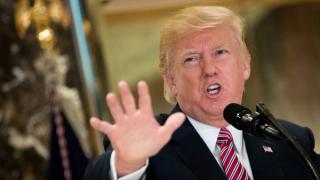One year into the Trump administration, Australians and Americans feel the world is more dangerous and that a weaker United States is less well-placed to deal with security threats. Exclusive survey data from a United States Studies Centre and YouGov poll, run in December, has drawn a comparison of public opinion on the perceptions of security and the strength of the United States, in both Australia and the United States.
Seventy-seven per cent of Australians believe that things are more dangerous for the entire world and 78 per cent believe that things had become more dangerous for the United States, while fewer – just 54 per cent – believed things have become more dangerous for Australia.
Americans appear to hold similar views. Seventy-one per cent believed things are more dangerous for the entire world, 64 per cent that things had become more dangerous for the United States, and 56 per cent believed it had become more dangerous for America’s allies.
Australians were more likely to be pessimistic on the strength of the United States, with 46 per cent saying it had become weaker and only 19 per cent that it had become stronger. Americans were slightly more positive. Thirty-six per cent believed their country had become weaker, and 30 per cent that it had become stronger. There were large variations in how Democrats and Republicans responded. More than 70 per cent of Democrats said America had become weaker, while fewer than 7 per cent of Republicans agreed.
Does a stronger (or weaker) America under President Trump affect assessments of Australia's security? It's complicated. In the aggregate, Australians associate a stronger America with a safer world and a safer United States, but this does not extend to assessments of Australian security. Americans who said the United States has become weaker were 20 per cent more likely to say things were more dangerous for the world, 33 per cent more likely to believe there was more danger for the United States and 24 per cent more likely to say things are more dangerous for America’s allies, than those who did not believe the United States had become weaker.
Historically, a robust, bipartisan consensus has seen little partisanship in Australian public opinion on the value of Australia's relationship with the United States. This proposition has been the bedrock of Australian foreign policy and defence planning for decades. Our data suggest that this equilibrium is under some stress. References to Trump activate partisan differences in Australian thinking about the United States. While Australians (like Americans) associate increases in American power with a safer world, a perceived link with enhanced Australian security is weak at best (and probably inverted for Greens voters).
Accordingly, our data allows us to restate the challenge for the current generation of Australian policymakers and political leaders. They need to continue to articulate the value and relevance of the US relationship to an Australian public at best unsure about the direction of the United States under Trump, and the implications for Australia's security and prosperity.






